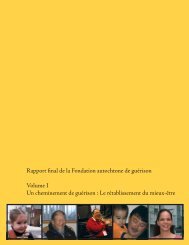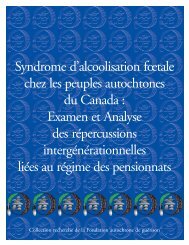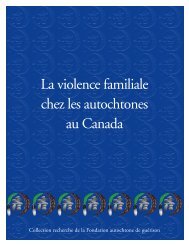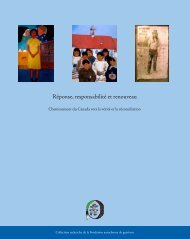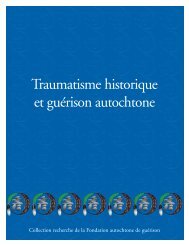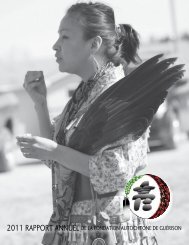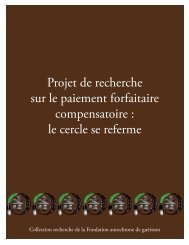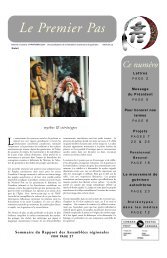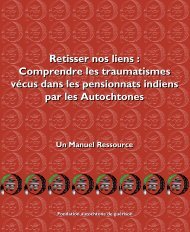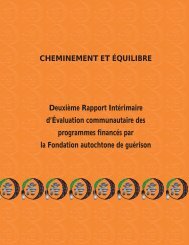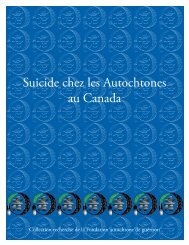- Page 3 and 4:
CULTIVER LE Canada Réconciliation
- Page 5 and 6:
Table des matières iii Introductio
- Page 7 and 8:
Georges Erasmus, président Fondati
- Page 9 and 10:
Introduction Le troisième et derni
- Page 11 and 12:
contemporains qui cultivent les ter
- Page 13 and 14:
ashok Mathur
- Page 15 and 16:
Cultures, Terre et une politique du
- Page 17 and 18:
l’identification inexacte. Cela s
- Page 19 and 20:
Tout cela, un terrain fertile (quoi
- Page 21 and 22:
attachant. Malgré que les collabor
- Page 23:
Section 1 : Terre
- Page 26 and 27:
Shirley Bear est une artiste multim
- Page 28 and 29:
de mes amis étaient socialement en
- Page 30 and 31:
Shirley Bear, Geljid ahbid pqomik,
- Page 32 and 33:
sauver quelque chose de la situatio
- Page 34 and 35:
appelé le cercle de guérison des
- Page 36 and 37:
Henry Tsang se consacre aux arts vi
- Page 38:
Henry Tsang, Napa North (The Rise)
- Page 41 and 42:
Henry Tsang, de Napa North (2008) I
- Page 43 and 44:
egard et défiant la solemnité de
- Page 45:
Henry Tsang, Napa North (Summerhill
- Page 48 and 49:
Cheryl L’Hirondelle est une artis
- Page 50 and 51:
Projet lié à la Terre : Une conve
- Page 52 and 53:
Cheryl : Je pense que nous devons b
- Page 54 and 55:
Cheryl : Oui, kitimâkisiw. Dans la
- Page 56 and 57:
et souples. C’était plus en vue
- Page 58 and 59:
aussi enviables pour les repeupler
- Page 60 and 61:
qu’Israël contrôle tout. Israë
- Page 62 and 63:
individuellement la terre, c’est
- Page 65 and 66:
Sandra Semchuk (avec James nicholas
- Page 67 and 68:
Cultiver le Canada | 55
- Page 69 and 70:
Cultiver le Canada | 57
- Page 71:
« Prêté »: Réflexions sur la f
- Page 75 and 76:
Mon père, Martin Semchuk, m’a de
- Page 77 and 78:
Plus lourd du fait qu’il est deve
- Page 79 and 80:
pensionnats, j’en ai appris beauc
- Page 81 and 82:
dorothy Christian
- Page 83 and 84:
Se réconcilier avec le Peuple et l
- Page 85 and 86:
série qui a duré pendant huit sai
- Page 87 and 88:
débuté par l’exploration de la
- Page 89 and 90:
Dans une démarche de guérison, un
- Page 91 and 92:
Il y a certains aspects de cet idé
- Page 93:
14 Christian et Freeman (2010:381).
- Page 96 and 97:
Rita Wong est née là où les terr
- Page 98 and 99:
des pensionnats sans actions adapt
- Page 100 and 101:
Dans le bassin du staľǝw (Fraser)
- Page 102 and 103:
arrer la route à cette page d’hi
- Page 104 and 105:
17 Ce terme fait référence à la
- Page 106 and 107:
Sylvia d. Hamilton est cinéaste et
- Page 108 and 109:
« Les préjudices exercés à l’
- Page 110 and 111:
et celui de refuser de dispenser d
- Page 112 and 113:
Je suis intéressée par deux quest
- Page 114 and 115:
au Canada, une ségrégation prescr
- Page 116 and 117:
pleinement opérationnelles dans de
- Page 118 and 119:
vite passé, où se transmettaient
- Page 120 and 121:
Par conséquent, la question est la
- Page 122 and 123:
ont été remplacés par le courage
- Page 124 and 125:
(le 2 novembre 2010). The Globe and
- Page 126 and 127:
incluent les cimetières Redhead da
- Page 129:
Meera Margaret Singh
- Page 133:
Patricia, 30" x 40",épreuve couleu
- Page 137:
Avia, 30" x 40", épreuve couleur C
- Page 141 and 142:
Evelyn et Nikki, 30" x 40", épreuv
- Page 143 and 144:
Beyond Imaginings : Photographies d
- Page 145 and 146:
pour éplucher une problématique c
- Page 147 and 148:
je me demande si je peux seulement
- Page 149:
Section 2 : À travers
- Page 152 and 153:
De descendance arabe, Jamelie Hassa
- Page 154 and 155:
Histoires parallèles Jamelie Hassa
- Page 156 and 157:
Figure 1. The Snowball, Sioux Falls
- Page 158 and 159:
Figure 3. Sioux Falls, Dakota du Su
- Page 160 and 161:
Ces Arabes qui sont venus au Canada
- Page 162 and 163:
Figure 5. JL’ouvrage en céramiqu
- Page 164 and 165:
1953 Jane Elm de l’établissement
- Page 166 and 167:
Figure 8. Miriam Ahmet-Allah Jordan
- Page 168 and 169:
[traduction] Après la Seconde Guer
- Page 170 and 171:
Geographical Snowballs de Jamelie H
- Page 172 and 173:
evient à l’architecte autochtone
- Page 174 and 175:
2001, les attaques du 11 septembre
- Page 176 and 177:
2009 Jeff Thomas, artiste et conser
- Page 178 and 179:
11 Se reporter à Travelling Theory
- Page 180 and 181:
Renisa Mawani est professeure agré
- Page 182 and 183:
Les textes sur l’interrelation ra
- Page 184 and 185:
qu’à des témoignages de témoin
- Page 186 and 187:
En dépit des nombreuses critiques
- Page 188 and 189:
donnant [traduction] « une accréd
- Page 190 and 191:
aciales. 46 À certains égards, c
- Page 192 and 193:
politiciens entre la Californie et
- Page 194 and 195:
la respectabilité et la dignité d
- Page 196 and 197:
état d’apathie comme un animal p
- Page 198 and 199:
éparti le nombre de cas d’arrest
- Page 200 and 201:
eprésentation d’une hétérogén
- Page 202 and 203:
eaucoup moins convaincues des possi
- Page 204 and 205:
La protection de la vie des Blancs
- Page 206 and 207:
9 Royal Commission on Chinese Immig
- Page 208 and 209:
orders with Canada and Mexico, 1882
- Page 211 and 212:
Rhose Harris-Galia
- Page 213 and 214:
Arctic Bayanihan 1 Dans la plupart
- Page 215 and 216:
Cela est vrai jusque dans le Grand
- Page 217 and 218:
ouvertement, quelle que soit notre
- Page 219:
notes 1 Bayanihan est un terme phil
- Page 222 and 223:
Né en Chine et « fils sur papier
- Page 224 and 225:
Dieu merci, ouvrir et exploiter un
- Page 226 and 227:
qu’il accordait du crédit aux r
- Page 228 and 229: Ma Ah Nging ricane et dit : « Oh o
- Page 230 and 231: R: Vince, n’as-tu rien d’autre
- Page 232 and 233: R: Vous ne me connaissez pas Gim. V
- Page 235 and 236: Ronald Lee
- Page 237 and 238: La tentative de génocide et d’et
- Page 239 and 240: Aux yeux de l’église, le blanc s
- Page 241 and 242: l’emprisonnement, à l’enregist
- Page 243 and 244: Mentesi, et la journaliste américa
- Page 245 and 246: des chansons populaires comme Gypsi
- Page 247 and 248: A New Look at Our Romani Origins an
- Page 249: 35 The Swiss Gypsies: the jenisch.
- Page 252 and 253: Bonita Lawrence (Mi’kmaw) est pro
- Page 254 and 255: personnes de couleur comme autant d
- Page 256 and 257: je pense que nous avons échoué à
- Page 258 and 259: sur lesquels des traités ont été
- Page 260 and 261: détiennent ou qui leur sont rendus
- Page 262 and 263: acisme. Par conséquent, nous craig
- Page 264 and 265: d’explorer les façons dont des d
- Page 266 and 267: peuples autochtones et la décoloni
- Page 268 and 269: déforme notre écriture de l’his
- Page 270 and 271: a les façons dont, en tant que cit
- Page 272 and 273: autochtone et détournent l’atten
- Page 274 and 275: entre les activistes antiracistes e
- Page 276 and 277: première est la destruction du sch
- Page 281 and 282: Robinder Kaur Sehdev
- Page 283 and 284: Les personnes de couleur et les tra
- Page 285 and 286: d’être témoin et victime du rac
- Page 287 and 288: Relations issues de traités La man
- Page 289 and 290: équitablement. » 20 Le gouverneme
- Page 291 and 292: pionnière stable est une nation qu
- Page 293 and 294: Srimoyee Mitra
- Page 295 and 296: Apprendre à franchir les barrière
- Page 297 and 298: au Canada et à l’instauration du
- Page 299 and 300: Jeff Thomas, A Conversation with Ed
- Page 301 and 302: Animose 2; Greg Staats, Animose, 19
- Page 303 and 304: Part Two. En réfléchissant sur le
- Page 305 and 306: hégémoniques d’une histoire nat
- Page 307 and 308: Malissa Phung
- Page 309 and 310: Les peuples de couleur sont-ils aus
- Page 311 and 312: à différents degrés, selon diver
- Page 313 and 314: des ressources qui appartenaient à
- Page 315 and 316: décrit aussi un système politique
- Page 317 and 318: Henry Yu
- Page 319: Promouvoir le dialogue entre les Pr
- Page 322 and 323: Chinois, tout comme mon grand-père
- Page 324 and 325: En 2006, 83,9 % de l’ensemble des
- Page 326 and 327: ceux dont les histoires ont souvent
- Page 329 and 330:
Roy Miki
- Page 331 and 332:
Poésie alternative : Le redresseme
- Page 333 and 334:
Photo : Archives nationales du Cana
- Page 335 and 336:
qu’une attention particulière so
- Page 337 and 338:
Photo : Leonard Frank, Canadien jap
- Page 339 and 340:
pour la conférence, quand soudain
- Page 341 and 342:
la voix la plus défavorable aux CJ
- Page 343:
sur l’internement. Ces photos ont
- Page 346 and 347:
Ravi de Costa est professeur adjoin
- Page 348 and 349:
Que peuvent et doivent tenter de fa
- Page 350 and 351:
étudiants sur le campus, et les pa
- Page 352 and 353:
des étudiants universitaires canad
- Page 354 and 355:
qui incluait tous les Canadiens non
- Page 356 and 357:
Conclusion Bien entendu, les partic
- Page 358 and 359:
13 La question : « Pourquoi ne nou
- Page 360 and 361:
Rinaldo Walcott est professeur agr
- Page 362 and 363:
s’appuyant sur le cas d’Haïti,
- Page 364 and 365:
se soit produite. J’ai précédem
- Page 366 and 367:
moderne, je ne suis pas encore prê
- Page 369 and 370:
Mitch Miyagawa
- Page 371 and 372:
Un bien triste État [Une version d
- Page 373 and 374:
en l’honneur du vingtième annive
- Page 375 and 376:
au sujet de l’incident du Komagat
- Page 377 and 378:
abstraits — réconciliation, comp
- Page 379 and 380:
tenté de les abattre dans le cadre
- Page 381 and 382:
compensation et de présenter devan
- Page 383 and 384:
Jen Budney et Jayce Salloum
- Page 385 and 386:
Stimuler la responsabilité de l’
- Page 387 and 388:
des ressources et de l’accès par
- Page 389 and 390:
Bien que cette œuvre, untitled par
- Page 391 and 392:
Leonard Raphael, à sa maison de la
- Page 393 and 394:
ou d’une situation. En d’autres
- Page 395:
Nathan Lynn a créé le thème cent
- Page 398 and 399:
les ateliers, tenus une ou deux foi
- Page 400 and 401:
notes 1 Marks, Laura U. (2003:18).
- Page 402 and 403:
Rita Shelton deverell: Après plus
- Page 404 and 405:
absents à Regina. Pour de nombreus
- Page 406 and 407:
assurance, ils étaient en mesure d
- Page 408 and 409:
Musulmans, juifs, hindous, quakers,
- Page 410 and 411:
armé assassiné, ait supplié et m
- Page 412 and 413:
pensent ainsi que le grand nombre d
- Page 415 and 416:
George Elliott Clarke
- Page 417 and 418:
« Les Noirs autochtones » : Une i
- Page 419 and 420:
avance de plus que le terme « noir
- Page 421 and 422:
Elle conclut par une horrible proph
- Page 423 and 424:
Identité Étant un Métis pur-sang
- Page 425 and 426:
diyan achjadi
- Page 427 and 428:
Fille : une fusion esthétique Reco
- Page 429 and 430:
Cultiver le Canada | 417
- Page 431 and 432:
Diyan Achjadi, Cérémonie (2007) I
- Page 433 and 434:
Diyan Achjadi, Combat (2010) Impres
- Page 435 and 436:
Diyan Achjadi, À la gloire de... (
- Page 437:
entrer dans son personnage, indépe
- Page 440 and 441:
Kirsten Emiko McAllister vient d’
- Page 442 and 443:
aleine, et toujours plus haut. Je s
- Page 444 and 445:
exige : (a) la reconnaissance sinc
- Page 446 and 447:
Portraits mémoriels J’étais une
- Page 448 and 449:
donné un coup de poing sur le nez
- Page 450 and 451:
grandes brutes qui me harcelaient,
- Page 452 and 453:
qui avait compétence sur la régio
- Page 454 and 455:
plus pour Kuper Island. Comment ét
- Page 456 and 457:
eligion organisée. Bien que je me
- Page 458 and 459:
mêmes à des « Chinetoques » et
- Page 460 and 461:
nos propres voies et luttes, qui ne
- Page 462 and 463:
des Autochtones qui accueillaient l
- Page 464 and 465:
Sobchack décrit ce regard comme un
- Page 466 and 467:
42 Les définitions de la pitié, d
- Page 468 and 469:
Mike deGagné est le directeur exé
- Page 470 and 471:
Ce ne fut pas le cas. Il y avait un



